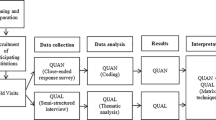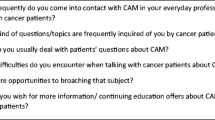Abstract
A sizeable percentage of patients receiving conventional medical treatment also use unconventional medicine (UM). Surveys indicate that the prevalence of and motivation for the pursuit of the different approaches of UM is subject to individual, geographical, cultural and disease-related factors. We were interested in the concurrent use of and attitudes towards UM in patients who underwent conventional medical treatment in our oncologically orientated department of internal medicine in a regionally dominant teaching hospital. A representative sample (n=131) of all inpatients and outpatients receiving treatment in the department or in its oncological/haematological outpatient clinic were asked to participate in a cross-sectional interview study on the use of unconventional therapies. In all, 128 patients (97.7%) agreed to participate in the study, and 65% of these patients were suffering from malignancies. Use of unconventional treatment was reported by 24% of all patients for their current medical problem, and 16% of the remaining patients had been thinking of adjunctive use. The use of UM was significantly higher among oncological patients (32%), and among oncological outpatients in particular (50%), than among patients with acute or chronic nonmalignant diseases. Female patients predominated among the users of UM (71%). UM mainly took the form of various pharmacological and dietary approaches. Patients availing themselves of UM most frequently identified physicians (41%) as the source of treatment recommendation. Only 18% of the users of UM relied on these methods as a chance of cure. Use of UM was not generally motivated by dissatisfaction with conventional medical care. Only half the users informed their hospital physician of their adjunctive use of UM. Nearly 2 out of 3 of the users contended that UM had contributed to a mild or distinct improvement in their physical or psychological wellbeing. The use of UM in modern health care systems represents a widespread and intricate phenomenon, which cannot be understood by focusing exclusively on the objective assessment of clinical efficacy. Use of UM may be related more to a disease's unfavourable attribution than to its medically expected outcome. Coherence with individual illness paradigms and perceived efficacy are apparently important factors in patients' use of UM. These subjective aspects need to be recognised in caring patient–doctor communication.
Similar content being viewed by others
Author information
Authors and Affiliations
Additional information
Published online: 18 November 1999
Rights and permissions
About this article
Cite this article
Kappauf, H., Leykauf-Ammon, D., Bruntsch, U. et al. Use of and attitudes held towards unconventional medicine by patients in a department of internal medicine / oncology and haematology. Support Care Cancer 8, 314–322 (2000). https://doi.org/10.1007/s005209900111
Issue Date:
DOI: https://doi.org/10.1007/s005209900111




